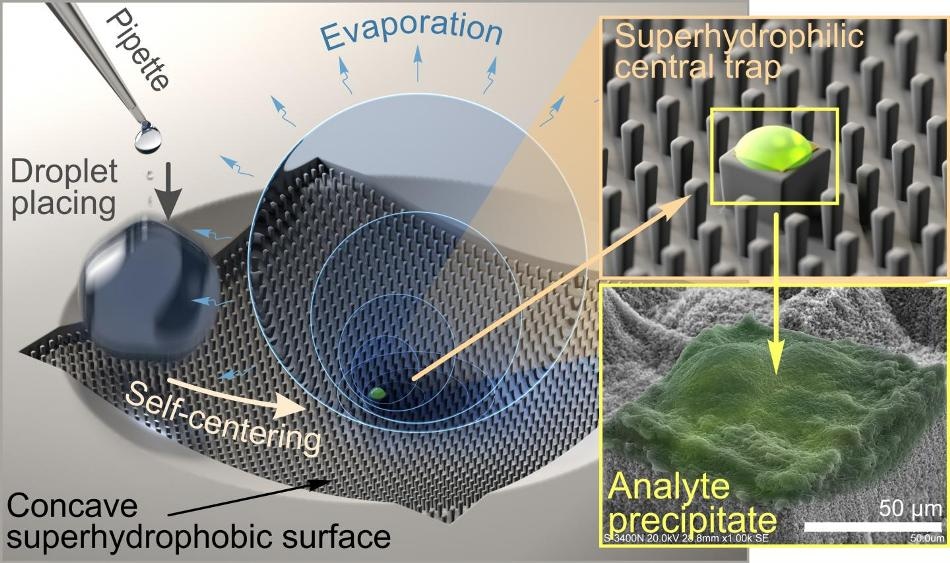Nov 13 2018
A new technology for trapping and chemical analysis of non-organic and organic molecules at trace concentrations has been developed by an international group of physicists from Far Eastern Federal University (FEFU), Swinburne University of Technology (Australia), and the Russian Academy of Sciences. The article was published in the Nanoscale journal released under the patronage of the Royal Society of Chemistry.
 This is a picture explaining how the concentrator platform works. (Image credit: the team of 'Nanotechnologies' scientific educational center, FEFU)
This is a picture explaining how the concentrator platform works. (Image credit: the team of 'Nanotechnologies' scientific educational center, FEFU)
The latest findings may result in more productive solutions in chemistry, biochemistry, medicine, and microbiology by providing rapid identification of cancer markers, toxic and harmful substances, and metabolites of pathogens in ultra-low concentrations.
The researchers developed an exclusive concentrator platform using Teflon as a substrate. This platform allows as much as a million times increase in the concentration of molecules being detected. The innovative technology reduces the time needed for state-of-the-art biochemical analyses from many days to only a few hours.
The key element of the concentrator is a micro- and nano-structured superhydrophilic (water attracting) trap surrounded by a superhydrophobic (water repellent) area. In our concentrator an ordinary liquid droplet plays the role of a container for controlled transport of the target molecules to the superhydrophilic trap. This transport is made possible by controlling the size and position of the droplet in the course of vaporization, which is achieved by tailoring and optimizing the wetting properties of the substrate.
Alexey Zhizhchenko, Research Associate, Nanotechnology Research and Education Center, FEFU School of Engineering.
About 97% of the target molecules are subsequently localized on the tiny trap (which has the size of a human hair thickness) and the concentration of these molecules increases over a million times when compared to its original value, leading to a significant improvement in the optical response of the trapped molecules. By integrating this feature with the trap’s highly sensitive chemical detection properties, researchers successfully detected and identified target substances even if there are only a few hundred molecules of those in the droplet. In addition, further improvement of the concentrator design may possibly help in the detection of single molecules.
To develop the concentrator platform, direct laser recording is done on Teflon substrates using ultra-short pulses. Since this procedure does not need tight laser focusing, it can be completed in just 2 minutes. The technology is relatively cheap and versatile, and can possibly be applied for making next-generation biosensor platforms for extremely sensitive and accurate chemical analysis.
This achievement by the team of the Nanotechnology Research and Education Center (School of Engineering, FEFU) became possible thanks to the “Materials” priority project which is currently being implemented at FEFU. We managed to gather an active international team of world-level scientists, many of whom are under 30 years old.
Kirill Golokhvast, Vice Rector for Research, FEFU.
As part of an international workgroup of researchers, the same group of scientists from FEFU developed a technology earlier this year for detecting substances at trace concentrations through a black silicon substrate platform. The specific morphology of the black silicon allows it to intensify the Raman signal—the light dispersed by the molecules being studied—and it does not distort spectroscopic results thanks to its noninvasiveness. This implies that it does not react with the target substance.